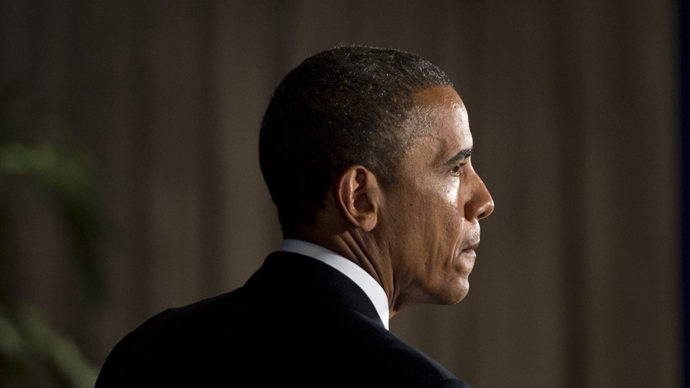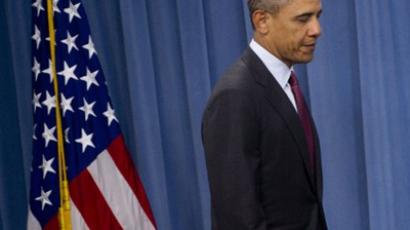Obama wins back the right to indefinitely detain under NDAA

The Obama administration has won the latest battle in their fight to indefinitely detain US citizens and foreigners suspected of being affiliated with terrorists under the National Defense Authorization Act of 2012.
Congress granted the president the authority to arrest and hold individuals accused of terrorism without due process under the NDAA, but Mr. Obama said in an accompanying signing statement that he will not abuse these privileges to keep American citizens imprisoned indefinitely. These assurances, however, were not enough to keep a group of journalists and human rights activists from filing a federal lawsuit last year, which contested the constitutionality of Section 1021, the particular provision that provides for such broad power.
A federal judge sided with the plaintiffs originally by granting an injunction against Section 1021, prompting the Obama administration to request an appeal last year. On Wednesday this week, an appeals court in New York ruled in favor of the government and once again allowed the White House to legally indefinitely detain persons that fit in the category of enemy combatants or merely provide them with support.
Now with this week’s appellate decision, plaintiffs intend on taking their case to the Supreme Court. Should the high court agree to hear their argument, the top justices in the US may finally weigh in on the controversial counterterrorism law.
The so-called “indefinite detention” provision of last year’s National Defense Authorization Act has been at the center of debate since before President Barack Obama autographed the bill in December 2011, but a federal lawsuit filed by Pulitzer Prize-winning war correspondent Chris Hedges and others only two weeks after it went into effect remains as relevant as ever in light of a decision delivered Wednesday by the US Court of Appeals for the Second Circuit.

The plaintiffs in case had previously been successful in convincing a federal district judge to keep Section 1021 from being put on the books, but the latest ruling negates an earlier injunction and once again reestablished the government’s right to indefinitely detain people under the NDAA.
Tangerine Bolen, a co-plaintiff in the case alongside Hedges, told RT, “Losing one battle is not losing the war. This war is an assault on truth itself. It flaunts reason, sanity and basic decency. We will not stand down in the face of these egregious assaults on our rights and liberties.”
In a statement published to TruthDig, Hedges called the ruling “distressing” and said, “It means there is no recourse now either within the Executive, Legislative or Judicial branches of government to halt the steady assault on our civil liberties and most basic Constitutional rights.”
Section 1021 of the NDAA reads in part that the president of the US can indefinitely imprison any person who was part of or substantially supported al-Qaeda, the Taliban or associated forces engaged in hostilities against the US or its coalition partners, as well as anyone who commits a "belligerent act" against the US under the law of war, "without trial, until the end of the hostilities.” The power to do as much was allegedly granted to the commander-in-chief after the Authorization to Use Military Force was signed into law shortly after the September 11, 2001 terrorist attacks, but a team of plaintiffs have argued that Section 1021 provides the White House with broad, sweeping powers that put the First Amendment-guaranteed rights to free speech and assembly at risk while also opening the door for the unlawful prosecution of anyone who can be linked to an enemy of the state.
Only two weeks after the 2012 NDAA was signed into law, Hedges filed a lawsuit against the Obama administration challenging the constitutional validity of Section 1021.
“I have had dinner more times than I can count with people whom this country brands as terrorists … but that does not make me one,” he said at the time.
Naomi Wolf, an American author, told the Guardian last year that she has skipped meetings with individuals and dropped stories that she believed are newsworthy “for no other reason than to avoid potential repercussions under the bill.”

Hedges first filed suit on Jan 13, 2012, and was eventually
joined by a number of activists, reporters and human rights
workers from both the US and abroad, including Pentagon Papers
leaker Daniel Ellsberg, journalist Alexa O’Brien, Revolution
Truth founder Bolen and Icelandic PM Birgitta Jónsdóttir.
District Court Judge Katherine Forrest granted the plaintiffs a
preliminary injunction against Section 1021 that May, only to
make that decision permanent four months later. The Obama
administration filed a stay against that injunction just days
after, though, and the appeals court ruled this week that Judge
Forrest’s decision must be vacated.
Carl Mayer, an attorney for the plaintiffs, previously told RT that he expected the White House
to lose the appeal. “The Obama administration has now lost
three times. They lost the temporary injunction, they lost the
motion for reconsideration and they lost the hearing for
permanent injunction. I say three strikes and you’re out,” he
said.
But with the court’s 3-0 ruling this week, a federal panel concluded that the plaintiffs involved in the suit do not have standing to challenge Section 1021. In doing so, however, they offered what is the most official interpretation yet of a law that has continuously attracted criticism for nearly two years now.
After years of debate, the appeals court said once and for all that the NDAA does not apply to American citizens, and rehashed the Obama administration’s insistence that it simply reaffirmed rights afforded to the government through the AUMF.
“Section 1021(e) provides that Section 1021 just does not speak — one way or the other — to the government’s authority to detain citizens, lawful resident aliens or any other persons captured or arrested in the United States,” the court ruled.
“We thus conclude, consistent with the text and buttressed in part by the legislative history, that Section 1021 means this: With respect to individuals who are not citizens, are not lawful resident aliens and are not captured or arrested within the United States, the President’s AUMF authority includes the authority to detain those responsible for 9/11 as well as those who were a part of, or substantially supported, al-Qaeda, the Taliban or associated forces that are engaged in hostilities against the United States or its coalition partners — a detention authority that Section 1021 concludes was granted by the original AUMF.”
“But with respect to citizens, lawful resident aliens, or individuals captured or arrested in the United States, Section 1021 simply says nothing at all,” it concluded.
The AUMF, however, is still open to interpretation. An earlier legal ruling concluded that the AUMF “clearly and unmistakable” authorized detaining those who were “part of or supporting forces hostile to the US.” Then a memo issued in March 2009 just weeks’ into Pres. Obama’s first term even added that the government has the authority “to detain persons who were part of or substantially supported” anyone engaged in hostilities against US or its partners.
“In any event, the March 2009 Memo took the view that ‘the AUMF is not limited to persons captured on the battlefields of Afghanistan’ nor to those ‘directly participating in hostilities,’” the appeals court noted. When the DC Circuit weighed in further down the road, it determined that the AUMF authorized detention for those who “purposefully and materially support” those hostile forces, although this week’s ruling makes note that the Circuit Court has failed to ever figure out what “support” exactly means.
“The government contends that Section 1021 simply reaffirms authority that the government already had under the AUMF, suggesting at times that the statute does next to nothing at all. Plaintiffs take a different view,” wrote the court this week.
Definitions aside, however, the appeals court wrote that Hedges and his American co-plaintiffs lack standing to challenge the indefinite detention provisions since a subsection of that rule, 1021(e), frees US citizens from detention under the NDAA.
“We recognize that Section 1021 perhaps could have been drafted in a way that would have made this clearer and that the absence of any reference to American citizens in Section 1021(b) led the district court astray in this case. Perhaps the last-minute inclusion of Section 1021(e) as an amendment introduced on the floor of the Senate explains the somewhat awkward construction,” wrote the court. “But that is neither here nor there. It is only our construction, just described, that properly gives effect to the text of all of the parts of Section 1021 and thus reflects congressional intent.”
At the same time, though, the appeals court acknowledged that Iceland’s Jónsdóttir, co-plaintiff Kai Wargalla of Germany and other foreign persons could be detained indefinitely under the NDAA. Although Jónsdóttir has argued that her well-documented affiliation with the anti-secrecy group WikiLeaks — particularly with regards to classified material its published much to the chagrin of the US government — is enough to land her in hot water, the court said indefinite imprisonment in a military jail cell is an unrealistic fear and she therefore lacks standing.
Jónsdóttir, 46, has been a member of the Iceland parliament since
2009, the same year that US Army Private first class Bradley
Manning began supplying materials to WikiLeaks. Jónsdóttir and
WikiLeaks founder Julian Assange worked directly with raw video
footage supplied by Manning showing a US helicopter fatally
wounding innocent civilians and journalists, which the website
later released under the name “Collateral Murder.” And although
Pfc. Manning is currently on trial for “aiding the enemy” by
supplying WikiLeaks — and indirectly al-Qaeda — with that
intelligence, the court said Jónsdóttir herself has nothing to
fear.
“The claims of Jónsdóttir and Wargalla stand differently. Whereas Section 1021 says nothing about the government’s authority to detain citizens, it does have real meaning regarding the authority to detain individuals who are not citizens or lawful resident aliens and are apprehended abroad,” the court ruled.
Elsewhere, the judges wrote that the government insists that WikiLeaks and Manning provided “some support” to hostile forces by publishing classified intelligence, and that the 25-year-old Army private is indeed facing prosecution for such that could put him away for life.
“One perhaps might fear that Jónsdóttir’s and Wargalla’s efforts on behalf of WikiLeaks could be construed as making them indirect supporters of al-Qaeda and the Taliban as well,” wrote the court. “The government rejoins that the term ‘substantial support’ cannot be construed so in this particular context. Rather, it contends that the term must be understood — and limited — by reference to who would be detainable in analogous circumstances under the laws of war.”
Because “plaintiffs have provided no basis for believing that the government will place Jónsdóttir and Wargalla in military detention for their supposed substantial support,” the court has rejected their lawsuit.
“In sum, Hedges and O’Brien do not have Article III standing to challenge the statute because Section 1021 simply says nothing about the government’s authority to detain citizens,” concluded the court. “While Section 1021 does have meaningful effect regarding the authority to detain individuals who are not citizens or lawful resident aliens and are apprehended abroad, Jónsdóttir and Wargalla have not established standing on this record. We vacate the permanent injunction and remand for further proceedings consistent with this opinion.”
Meanwhile, the court’s decision did little to resolve what actually is allowed under the AUMF. In fact, the court said Section 1021 “does not foreclose the possibility that previous 'existing law' may permit the detention of American citizens,” making note of American Yaser Esam Hamdi and a three-year ordeal that left him without the right to habeas corpus or an attorney after he was picked up in post-9/11 Afghanistan on suspicion of terroristic ties. Instead, it confirmed that foreign citizens engaged with substantially supporting hostile forces— neither of which term is still properly defined — can be locked up in military jails.
Hedges previously said that he thought that the US was already using the NDAA to put some people away.
“If the Obama administration simply appealed it, as we expected, it would have raised this red flag,” Hedges said during an online Q-and-A session on Reddit when the White House last fought back. “But since they were so aggressive it means that once Judge Forrest declared the law invalid, if they were using it, as we expect, they could be held in contempt of court. This was quite disturbing, for it means, I suspect, that US citizens, probably dual nationals, are being held in military detention facilities almost certainly overseas and maybe at home.”
In a statement published to TruthDig on Wednesday, Hedges said that he plans to appeal. If accepted, the case of Hedges v Obama may go all the way to the Supreme Court. That’s a decision that will weigh with the justices, however, and Hedges said they are by no means required to hear their request.
“It is a black day for those who care about liberty,” wrote Hedges.
In her statement to RT, Bolen rejected the notion that she and others lack standing to challenge a law that plaintiffs believe is being used in secrecy.
“Good people have come forward to challenge the madness of the US government in the wake of 9/11 - people who have every reason to fear this atrocious panoply of laws and policies that are fundamentally eroding guaranteed liberties and basic human rights,” she said.
“The United States Government itself is behaving as a terror. Through indefinite detention of innocent civilians at Guantanamo, secret rendition, torture, murder of hundreds of thousands of innocent civilians in Iraq and illegal drone bombings - it is fundamentally eroding the rule of law while harming national security. Courts are contradicting themselves on whether the government has the right to indefinitely detain even its own citizens, Congress has supported dragnet surveillance and other assaults on everything we were founded on, and yet somehow, our fears are only ‘speculation,’” she said.














